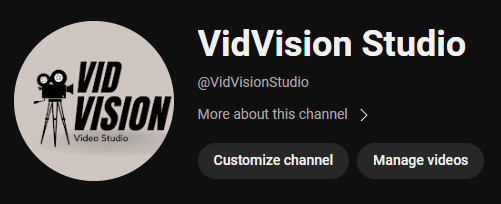Video Editing Works
Through a wide variety of mobile applications, we’ve developed a unique visual system.
- Video Link https://youtube.com/playlist?list=PLrk1XKuDi72YA43uhpaS2ZUeUrZi99LAV&si=8DXVLS7CiZxLdvYP
- My Service Video Editing
I am currently a university undergraduate and in the meantime ,I am eager to develop my skills.Joins youth associations inside and outside the University as an active member to develop leadership qualities.I am always energetic and eager to learn new skills. Specialy I am a dependable person who is great at time management.

Transforming videos with precision and creativity. Premiere Pro and CapCut experts crafting pixel-perfect designs to captivate audiences.
Expert graphic designer proficient in Photoshop, Canva, and Illustrator, crafting visually stunning designs tailored to your brand's vision and audience.
Efficiently uploading stock images using AI technology across platforms like Adobe Stock, Freepik, and Zedge, ensuring seamless integration and accessibility for users.
Experienced web developer specializing in WordPress websites, dedicated to creating functional and visually appealing online platforms tailored to your needs.
Skilled in SEO-optimized blog content writing, I create engaging articles that boost visibility and drive traffic to your website.
Crafting comprehensive marketing strategies tailored to your brand's unique needs and objectives.
Through a wide variety of mobile applications, we’ve developed a unique visual system.

Supported producer organizations in gender and youth profiling, collecting case stories and photographs to highlight impactful narratives. Coordinated gender and youth consultations, contributing to inclusive dialoguesand strategies
I had been working full-time at BOC bank for over 8 months and developing my skills in customer service, teamwork and also work as a PBO Section.
In this period I was completed Science Project about Usage of Energetic under the Proffecer Piyathissa Abeygunawardhana who were working at Predeniya University as a lecturer.
Actively involved in amplifying the voices of farmers and advocating for transformative changes in trade practices, emphasizing sustainable development and equitable trading conditions.
Managed financial operations and budgeting for club activities, contributing to the development and implementation of innovative projects and events within the university community.
I am currently a third-year student in the Faculty of Applied Sciences, studying the Department of Physical Sciences of Technology.
I have completed an Software Engineering Diploma Course at Esoft Metro Campus Matara.
I have completed Advanced Level coursework in Mathematics, Physics, and Chemistry as part of my secondary education.
I joined the work together - win together - we-gital online program. Was able to learn social media Strategy, hate speech, Citizen journalism, Digital Story Telling etc.
I was able to learn how to work as a young training instructor and the ethics to follow.
I was able to learn how to work as a young training instructor and the ethics to follow.
I was able to learn how to work as a young training instructor and the ethics to follow.
I was able to learn how to work as a young training instructor and the ethics to follow.
Verification Code: - https://confirm.udacity.com/e/e5da3550-0ae7-11ee-b993-7b17d6422d53
Verification Code: - D7L76LCPH
Verification Code: - UXXGJU9XYKA
Verification Code: - E8P99LPW39V9
Verification Code: - XWZS3BEB3A2G
Verification Code: - BPAYGG4FXYXH
Verification Code: - ZX9DLE86RNX2
Verification Code: - 5RK9B732F24Z
Verification Code: - DM2B6986XJA6
Verification Link: - https://api.badgr.io/public/assertions/2kq3CfeiQHKnylj2RDQOvQ?identity__email=ramishka1998%40gmail.com
Verification Link: - https://www.credly.com/badges/26acb6f0-ca9e-40ed-b3dd-294f8adb8df1
Verification Link: - https://www.ratatype.com/u3456187

Volunteering isn’t just about giving back; it’s a powerful tool for personal and professional development. So, we’ll explore the myriad ways in which volunteering can positively impact your career trajectory and personal growth journey.

Volunteering often conjures images of selflessness and altruism, and while these are indeed core aspects, its benefits extend far beyond the act of helping others. Whether you’re a seasoned professional or a fresh-faced undergraduate student, incorporating volunteering into your life can be transformative, shaping both your career path and personal development in profound ways.
Volunteering isn’t just about giving back; it’s a powerful tool for personal and professional development.
Volunteering encompasses a broad spectrum of activities, ranging from local community service initiatives to global humanitarian efforts. Regardless of the scale, each volunteer experience offers unique opportunities for growth and self-discovery. Let’s delve into some keyways in which volunteering can shape your journey:
Volunteering provides a fertile ground for honing existing skills and acquiring new ones. Whether you’re lending your expertise in web development to a non-profit organization or mastering project management through coordinating volunteer events, each endeavor offers valuable learning experiences. These skills not only enrich your personal skill set but also enhance your marketability in the professional arena.
Networking isn’t just about exchanging business cards at formal events; it’s about forging genuine connections based on shared values and experiences. Volunteering facilitates organic networking opportunities, allowing you to connect with like-minded individuals who are passionate about making a difference. These connections can lead to mentorship opportunities, job referrals, and lifelong friendships, enriching both your personal and professional networks.
In the hustle and bustle of daily life, it’s easy to become ensnared in our own bubble of existence. Volunteering exposes you to diverse perspectives and life experiences, fostering empathy and understanding for individuals from all walks of life. Whether you’re volunteering abroad or serving your local community, each encounter offers valuable insights that challenge preconceived notions and expand your worldview.
Volunteering isn’t always smooth sailing; it often entails navigating challenges and overcoming obstacles. These experiences cultivate resilience, teaching you to adapt and persevere in the face of adversity. Moreover, the act of giving back instills a sense of purpose and fulfillment, bolstering your self-esteem and empowering you to effect positive change in the world around you.
A: Finding time to volunteer doesn’t necessarily mean committing to lengthy projects. Even dedicating a few hours a month to local initiatives can make a significant impact. Additionally, many organizations offer flexible volunteering opportunities that can accommodate your schedule.
A: On the contrary, volunteering can enhance your career prospects by demonstrating valuable soft skills such as leadership, teamwork, and empathy. Many employers value volunteer experience as evidence of a well-rounded candidate who is committed to making a positive contribution to society.
A: Start by identifying causes or organizations that resonate with you personally. Reach out to local non-profits, community centers, or online platforms dedicated to volunteering to explore opportunities that align with your passions and expertise.
A: Absolutely! Volunteering locally can be equally impactful and rewarding. From tutoring disadvantaged youth to assisting at a homeless shelter, there are myriad ways to make a difference in your own community without incurring significant expenses.
Volunteering is a multifaceted journey that offers boundless opportunities for growth and self-discovery. Whether you’re seeking to enhance your professional skills, expand your network, or simply make a positive impact on the world, embracing the power of volunteering can enrich your life in ways you never imagined. So roll up your sleeves, step out of your comfort zone, and embark on a transformative journey of giving back. Your career and personal growth await!

Programming is not just about writing lines of code; it’s about understanding fundamental concepts that form the foundation of software development. Whether you’re a seasoned developer or just starting your coding journey, mastering these essential programming concepts is crucial for success. In this article, we’ll explore ten key concepts that every developer should prioritize learning. From basic principles to more advanced techniques, we’ll break down each concept in detail, providing examples and practical insights along the way.

As technology continues to evolve at a rapid pace, the demand for skilled programmers remains high. However, becoming proficient in programming requires more than just memorizing syntax. It involves grasping core concepts that underpin various programming languages and paradigms. By mastering these foundational principles, developers can write cleaner, more efficient code and tackle complex challenges with confidence.
Mastering programming is like building a sturdy house: start with a strong foundation of essential concepts, and the rest will fall into place.
At the heart of every program are variables, which store data and enable manipulation. Understanding different data types, such as integers, strings, and booleans, is essential for effective programming. Developers should know how to declare variables, assign values, and perform operations based on data type rules.
Control structures allow developers to dictate the flow of execution in a program. Conditionals, such as if statements and switch cases, enable decisions based on specified conditions. Loops, including for, while, and do-while loops, facilitate repetitive tasks by iterating over data or executing code blocks until certain conditions are met.
Functions are reusable blocks of code that perform specific tasks, promoting code organization and reusability. Developers should understand how to define functions, pass parameters, and return values. Modularization involves breaking down a program into smaller, manageable components, enhancing readability and maintainability.
Data structures are essential for storing and organizing data efficiently. Arrays, lists, and dictionaries are common data structures used to represent collections of elements. Developers should know how to manipulate these structures, access elements, and perform common operations like searching and sorting.
OOP is a programming paradigm centered around objects, which encapsulate data and behavior. Key principles of OOP include encapsulation, inheritance, and polymorphism. By modeling real-world entities as objects and leveraging classes and inheritance, developers can create more modular, scalable, and maintainable code.
Errors are an inevitable part of programming, but knowing how to handle them effectively is crucial for troubleshooting and maintaining code quality. Developers should be familiar with techniques for debugging, such as logging, breakpoints, and exception handling. By anticipating and addressing errors early in the development process, developers can prevent costly bugs and improve overall code reliability.
Algorithmic thinking involves breaking down problems into smaller, more manageable parts and devising efficient solutions. Developers should understand fundamental algorithms and data structures, such as searching and sorting algorithms, and know when to apply them to solve specific problems. By mastering algorithmic thinking, developers can write more efficient and scalable code.
Version control systems, such as Git, are essential tools for collaborative software development. Developers should understand basic VCS concepts, such as repositories, commits, branches, and merges. By using version control effectively, developers can track changes, collaborate with team members, and revert to previous versions when needed, ensuring project integrity and continuity.
Testing is a critical aspect of software development that ensures code correctness and reliability. Developers should know how to write unit tests, integration tests, and end-to-end tests to validate their code’s functionality. Test-driven development (TDD) is a methodology that emphasizes writing tests before implementing code, promoting better design and more robust software.
Writing efficient code is essential for ensuring optimal performance and scalability, especially in large-scale applications. Developers should understand techniques for optimizing code, such as algorithmic improvements, caching, and profiling. By identifying and addressing performance bottlenecks, developers can create faster, more responsive software that can handle increasing loads and user demands.
Mastering essential programming concepts is key to becoming a proficient developer. By gaining a deep understanding of variables, control structures, functions, data structures, OOP principles, and other fundamental concepts, developers can write cleaner, more maintainable code and solve complex problems with confidence. Whether you’re just starting your coding journey or looking to level up your skills, prioritizing these concepts will set you on the path to success in the dynamic world of software development.
A: Programming concepts provide a solid foundation for understanding how code works and how to solve problems effectively. By mastering these concepts, developers can write cleaner, more efficient code and adapt to new technologies and paradigms more easily.
A: Practice is key to improving your understanding of programming concepts. Write code regularly, experiment with different languages and paradigms, and seek out resources such as tutorials, books, and online courses to deepen your knowledge.
A: While the core concepts of programming are generally consistent across languages, syntax and implementation may vary. It’s essential to understand the principles behind the code rather than focusing solely on syntax, as this knowledge is transferable across different languages and technologies.

As an undergraduate student diving into the world of development, you’re faced with the challenge of balancing your academic responsibilities with your passion projects. Finding the equilibrium between excelling in your studies and pursuing side projects can be daunting, but fear not! In this comprehensive guide, we’ll explore actionable tips and strategies to help you navigate this delicate balancing act effectively. Whether you’re juggling assignments, attending lectures, or working on personal coding endeavors, this article is your roadmap to success.

The journey of an undergraduate developer is multifaceted, encompassing academic coursework, extracurricular activities, and personal aspirations. Balancing academics and side projects is crucial for several reasons:
uccess is not the key to happiness. Happiness is the key to success. If you love what you are doing, you will be successful.
To effectively balance academics and side projects, prioritize tasks based on urgency and importance. Utilize time management techniques such as Eisenhower’s Urgent/Important Principle or the Pomodoro Technique to allocate dedicated time slots for academic commitments and side projects.
Establish achievable goals for both academic endeavors and side projects, considering your workload and available resources. Break down larger tasks into smaller, manageable milestones to track progress and maintain motivation.
Utilize academic resources such as professors, mentors, and tutoring services to seek guidance and clarification on challenging concepts. Additionally, leverage online communities, forums, and developer networks to collaborate with peers, gain insights, and troubleshoot issues related to side projects.
Maintain a healthy balance between academic studies, side projects, and personal well-being by prioritizing self-care, exercise, and adequate sleep. Incorporate breaks and leisure activities into your schedule to prevent burnout and enhance productivity.
Remain adaptable and flexible in your approach to balancing academics and side projects. Be prepared to adjust your schedule, goals, and priorities as academic deadlines and project requirements evolve.
Effective time management involves prioritizing tasks, setting realistic goals, and utilizing techniques such as time blocking and task batching to maximize productivity.
While side projects can complement academic studies, it’s essential to maintain a balance and prioritize academic commitments to ensure academic success and fulfillment of degree requirements.
Find intrinsic motivation by selecting side projects aligned with your interests and career aspirations. Break down projects into smaller, achievable tasks, celebrate milestones, and seek support from peers and mentors to stay motivated and focused.
Reach out for support from academic advisors, mentors, or counseling services if you’re feeling overwhelmed. Consider adjusting your schedule, seeking assistance with academic tasks, or delegating responsibilities to maintain balance and well-being.
Balancing academics and side projects is a delicate dance that requires intentionality, discipline, and adaptability. By prioritizing tasks, setting realistic goals, leveraging resources, maintaining a balanced routine, and remaining adaptable, you can successfully navigate the challenges of undergraduate life while nurturing your passion for development. Remember, it’s not about achieving perfection but striving for progress and growth on both academic and personal fronts. Embrace the journey, celebrate small victories, and continue to pursue your dreams with determination and resilience. You’ve got this!

I am available for freelance work. Connect with me via and call in to my account.
Phone: +94 70 2 33 22 55 Email: ramishka1998@gmail.com